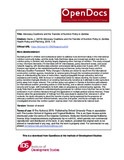| dc.contributor.author | Harris, Jody | |
| dc.coverage.spatial | Zambia | en |
| dc.date.accessioned | 2019-05-09T15:46:41Z | |
| dc.date.available | 2019-05-09T15:46:41Z | |
| dc.date.issued | 2019-03-26 | |
| dc.identifier.citation | Harris J. (2019) Advocacy Coalitions and the Transfer of Nutrition Policy to Zambia, Health Policy and Planning p1–9 | en |
| dc.identifier.uri | https://opendocs.ids.ac.uk/opendocs/handle/20.500.12413/14484 | |
| dc.description.abstract | Stunted growth in children and multisectoral action to address it are dominant ideas in the international nutrition community today, and this study finds that these ideas are increasingly evident over time in nutrition policy in Zambia, with stunting largely displacing other framings of nutrition. This study is based on key informant interviews (70 interviews with 61 interviewees), policy document review, and social network mapping, with iterative data collection and analysis taking place over 6 years (2011–2016). Analysis was based on two established political science theories: policy transfer theory and the Advocacy Coalition Framework. Policy changes in Zambia are shown to result from the international community’s nutrition agenda, transferred to national policy through the normative promotion of certain ways of understanding the issue of malnutrition, largely propagated through advocacy, technical assistance and funding. With its focus on multisectoral action to reduce stunting, the recent nutrition policy narrative impinges directly on an existing food security narrative as it attempts to alter agriculture policy away from maize reliance. The nutrition policy sub-system in Zambia is therefore split between an international coalition promoting action on child stunting, and a national coalition focused on food security and hunger, with implications for both sides on progressing a coherent policy agenda. This study finds that it is possible to understand policy processes for nutrition more fully than has so far been achieved in much nutrition literature through the application of multiple political science theories. These theories allow the generalization of findings from this case study to assess their relevance in other contexts: the study ultimately is about the transfer of policy being explained by the presence of advocacy coalitions and their different beliefs, resources and power, and these concepts can be investigated wherever the nutrition system reaches down from international to national level. | en |
| dc.language.iso | en | en |
| dc.publisher | Oxford Academic | en |
| dc.relation.ispartofseries | Health Policy and Planning; | |
| dc.rights.uri | http://creativecommons.org/licenses/by-nc-nd/4.0/ | en |
| dc.subject | Nutrition | en |
| dc.title | Advocacy Coalitions and the Transfer of Nutrition Policy to Zambia | en |
| dc.type | Article | en |
| dc.rights.holder | © The Author(s) 2019. Published by Oxford University Press in association with The London School of Hygiene and Tropical Medicine | en |
| dc.identifier.externaluri | https://academic.oup.com/heapol/advance-article/doi/10.1093/heapol/czz024/5475792 | en |
| dc.identifier.team | Health and Nutrition | en |
| dc.identifier.doi | 10.1093/heapol/czz024 | |
| dcterms.dateAccepted | 2019-03-26 | |
| rioxxterms.funder | Default funder | en |
| rioxxterms.identifier.project | Default project | en |
| rioxxterms.version | NA | en |
| rioxxterms.versionofrecord | 10.1093/heapol/czz024 | en |
| rioxxterms.funder.project | 9ce4e4dc-26e9-4d78-96e9-15e4dcac0642 | en |


